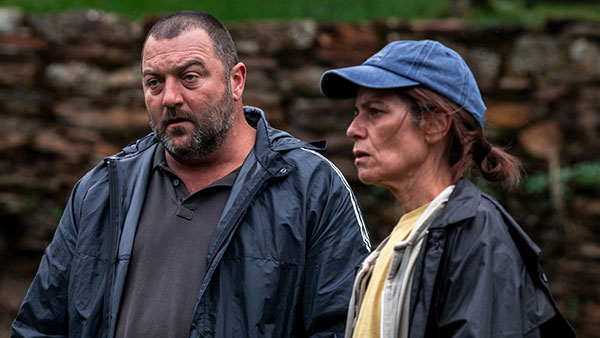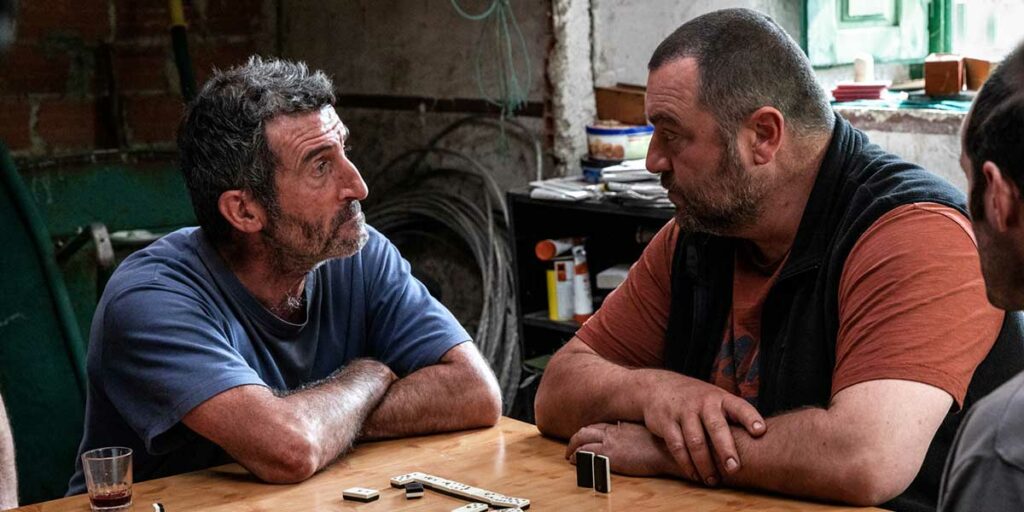Absolutely searing with tension, Rodrigo Sorogoyen’s rural noir The Beasts explores small-town grudges with an incredibly effective mid-film tonal shift.
Almost immediately, Rodrigo Sorogoyen’s The Beasts (As Bestas) has a palpable, searing tension. It’s a film that isn’t afraid to shock, but not in the way one might have expected. The climactic tension release doesn’t come at the end, instead it comes about halfway through. Its perspective then shifts, switching from a story about xenophobia and machismo to one about resilience and strength. It’s searing and powerful in both aspects, lingering like an uncomfortable shadow, but in the best possible way.
Antoine (Denis Ménochet) and Olga (Marina Foïs) are a French couple living in mountainous, rural Spain. They’re happily married, with a small farm where they craft organic vegetables to sell at the local market and renovate rundown houses in their spare time. But their seemingly idyllic life isn’t exactly tolerated by their native neighbours, brothers Xan (Luis Zahera) and Lorenzo (Diego Anido). They chafe at the incomers’ presence, perceived pompousness, and the fact that they voted against a windfarm scheme which would have seen the struggling locals pocket potentially life-changing money.
Sorogoyen’s film starts almost in media res, in a dimly lit pub where local men share drinks and debates over a game of dominoes. But there’s an edge to the dialogue, something mean in the manic gleam of Xan’s eyes that immediately ramps up the tension. But Xan isn’t our protagonist, instead it’s the unassuming figure drinking in the background who attempts to leave quietly that proves to be the focus of our attention – at least in the beginning. He’s stopped, snidely referred to as ‘Frenchie’, belittled, and then made to offer a reluctant farewell. It’s a moment poised on the edge, a pot seconds away from boiling over. But then ‘Frenchie’ leaves and the moment eases. Although not entirely.

Ménochet’s Antoine starts the film a weary figure. A hard worker who adores his wife, and this seemingly long-simmering feud with the locals clearly weighs on him. But as the snide comments turn to more overt intimidation, Antoine takes to not-so-secretly recording their interactions, seeking them out and pushing back where he might have let it go previously. And Sorogoyen masterfully ramps up the tension as he makes these decisions, coiling the spring tighter and tighter until it inevitably snaps. The shocking moment of cumulative violence, however, does not come at the end of a brutal, visceral, slog of a film where one is not so much on the edge of the seat but anxiously off of it entirely.
No, instead it comes half way through and acts as a turning point for the entire film. From a tonal perspective, The Beasts then becomes something different. In shifting focus to Olga, it then becomes a film about resilience, perhaps even obstinateness, and the quiet power in Olga’s ability to shoulder the disapproval and continue living her life. It’s a brave decision, and one that some filmmakers may have shied away from.
It also means the film is much more of a two hander – even four, if you include Zahera’s seething ‘villain’ and Marie Colomb’s stunningly emotional turn as Antoine and Olga’s daughter. Ménochet’s rage is much more overt, his emotions much quicker to surface and he almost seeks out confrontation. But Foïs is much more stoic, resilient, and obviously the clearer head if not any less angry. Foïs’ performance is delicately balanced and on the right side of ‘unemotional’ to not feel cold. Instead, she exists on screen like a ringing silence as the audience reels from the tension of the film’s first half. It’s an incredibly bold and affecting way to wrap up the film, especially when the ‘climactic event’ – one which beautifully echoes the film’s opening sequence – comes much earlier than expected.
Based somewhat on a true story, The Beasts is a film that explores the delicate balance of the ex-pat life. Particularly that in rural areas, where the locals’ existence is a tough one where years of hard work is needed to achieve something the middle-classes can come and pick up on a whim. It explores the way anger simmers and grudges rot like old wounds. It builds tension like a noir and stages confrontation like a western, and Sorogoyen amalgamates those genre aspects into something that feels really visceral, raw and incredibly powerful all on its own.
The Beasts will open in New York on July 28 (Film Forum), in LA on August 4 (Laemmle’s Royal), and nationwide in the US soon.

